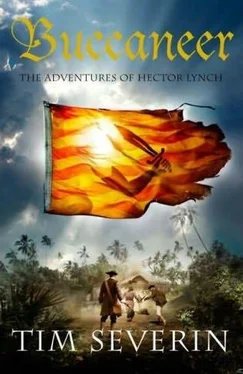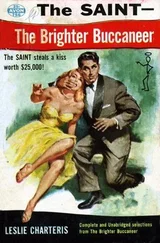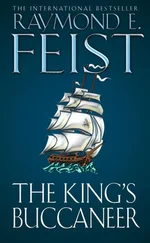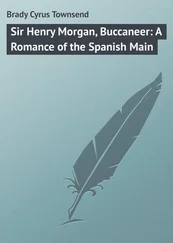'Well, what is it?' he asked gruffly as he and Hector moved out of earshot of the gamblers.
'There's a risk of a prisoner uprising,' Hector told him.
'Why so?'
'Because we don't have enough men to supervise the prisoners properly.'
The captain looked hard at Hector. 'Anything else?'
'Yes. It's not just the numbers of prisoners. We've been keeping back those who are wealthy or were officers on the ships we captured.'
'Of course. They were the only ones worth holding.'
'They are the ones most likely to organise an uprising.'
Sharpe made no reply, but looked out across the sea. The sinking sun had coloured the underbellies of the clouds a deep and angry red. It was as though a great fire had been lit beyond the horizon. It reminded Bartholomew Sharpe of the unsatisfactory outcome to the raid on the mainland a fortnight earlier. The Spaniards had already retreated into the hills, taking their valuables with them. He had threatened to burn down their houses and farms unless protection money was paid, but the Spaniards were astute. They dragged out the negotiations until they had gathered enough soldiers to chase the buccaneers back to the beach. In their frustration the raiders torched the farms anyhow.
A few days later forty members of his crew, dissatisfied with the poor progress of the venture, had left Trinity. They had sailed away on a captured bark, heading north on the return journey to the Caribbean. Barely a hundred members of the original expedition remained, and that was not enough to deter a revolt among the prisoners.
'What do you propose we do?' he asked Hector.
'Set the prisoners free.'
Sharpe gave Hector a calculating glance. Here was an opportunity to gain the young man's trust. The captain was aware that he and his friends were suspicious and resentful of him. But the trick with the loaded pistol had been a necessity. It had impressed the crew and cowed the Spaniards.
'Are you suggesting this because you are friendly with Captain Peralta?'
'No. I think it would be a prudent action.'
Sharpe thought for a moment. 'Very well. Next time we come to land, you will see that I can be generous, even with my enemies.' In fact he had already decided several days earlier to rid himself of the captives. No one seemed willing to pay a ransom for them, and they had become so many useless mouths to feed.
'Rocks! Rocks! Dead Ahead!' the lookout suddenly bellowed. Sharpe looked up in surprise. The note of alarm in the man's voice indicated that he had been dozing at his post and suddenly seen the danger. 'Reefs! Breaking water! No more than a quarter mile away.'
'Ringrose!' Sharpe shouted. 'What do you make of it?'
'Impossible! We're thirty miles off the coast,' exclaimed Ringrose who had taken a sun sight earlier in the day. He jumped up on the rail and shaded his eyes as he peered forward. 'I wish to God we had a decent chart. This groping about in the unknown is madness. One night we'll run ourselves full tilt onto a reef in the dark and never know what happened.'
'Rocks to starboard as well!' The lookout's voice was shrill with panic. This time his shout caused a surge of activity aboard Trinity. There was the noise of running feet as men appeared on the deck and rushed into the bows and gazed forward trying to identify the danger. 'Bear away to port,' Sharpe called out to the helmsman, 'and reduce sail.' The order was unnecessary. Men were already easing out the main sheets and bracing round the yards. Others were standing by the reefing tackles.
'White water to port!' roared a sailor. He was pointing, open-mouthed with alarm. There was a foaming patch on the surface of the sea no more than a hundred paces beside Trinity. The galleon had sailed herself into a trap. There were reefs on each side and ahead, and little room to manoeuvre. 'Bring her head to wind!' snapped Sharpe to the steersman.
'Lucky she's so nimble,' said Ringrose beside Hector as Trinity s bow turned into the wind, the sails came aback against the mast in an untidy tangle of ropes and sails, and the galleon came to a halt, gathered sternway and began to fall off on the opposite tack.
'Merde! Look there behind us! We sailed right over those rocks and never saw them.' Jacques had arrived on the quarterdeck and was gazing back towards the expanse of sea which the galleon had just negotiated. That too was boiling up in a white froth.
Beside him, Dan began to chuckle. Jacques looked at him in astonishment. 'What's so funny? We're boxed in by rocks!'
Dan shook his head. He was smiling. 'Not rocks . . . fish!'
Jacques scowled at him and then turned back to stare again at the sea. One of the foaming reefs had disappeared, abruptly sunk beneath the waves. But another had taken its place, fifty paces from the spot. There too the water was boiling upward.
'What do you mean . . . fish?'
Dan held up his hand, finger and thumb no more than three inches apart. 'Fish, small fish. More than you can count.'
Hector was concentrating on a nearby white patch. It was definitely on the move and coming closer to the ship. A moment later he saw that it was formed of myriads of tiny fish, millions upon millions of them, weaving and flashing and churning in a dense mass which occasionally broke the surface of the sea in a white spuming flurry. 'Anchovies!' cried Jacques.
There was relieved laughter from all around Trinity as the crew realised their error. 'Resume course!' ordered Sharpe. He, as much as anyone else, had been misled, but he had noted how the crew had taken matters into their hands in the imagined crisis. They had not consulted him, nor waited for orders. It was time that he found something to distract them.
He sent for the gentleman prisoner, Tomas de Argandona. The Spaniard was much less self-assured now that he had witnessed the shooting of the priest, and Sharpe was waiting in his cabin with a pistol lying on his desk. One glance and Argandona told Sharpe what he wanted to know: the nearest town on the mainland was La Serena and wealthy enough to have five churches and two convents. It lay two miles inland and had neither a garrison nor a defensive wall. A watchtower overlooked the closest anchorage but there was an unguarded landing beach some distance away. Small boats could put men ashore there and it was no more than a three-hour march to reach the town.
The general council held on the open deck the following morning went just as smoothly. The men voted overwhelmingly in favour of a raid.
'I propose John Watling to lead the attack,' Sharpe announced after Gifford, the quartermaster, had counted the show of hands. 'He lands with fifty men and takes the town by surprise. I then bring Trinity into the main anchorage and we ferry the plunder aboard.'
Looking on, Hector knew that Sharpe was being as wily as ever. Hector had seen little of Watling since the day they had been in the same canoe during the attack on Panama, but he knew Watling was popular with the men. He had sailed with
Morgan and they would follow him without question. He was one of those rigid, grim, old-fashioned Puritans who detested Catholics and observed the Sabbath scrupulously. Also, as Hector had noted, Sharpe had never been able to cheat Watling at dice, because he never gambled.
'Looks as though we were expected,' Dan said under his breath. He, Jezreel and Hector had come ashore with Watling's raiders as soon as there was enough daylight to approach the landing beach safely. Now they were trudging along the dusty coastal track that would lead them to La Serena. Jacques had been left behind with a dozen men to guard the boats.
Hector followed the Miskito's glance. From a spur of high ground overlooking the track a horseman was watching them. He made no attempt to conceal himself.
Читать дальше








